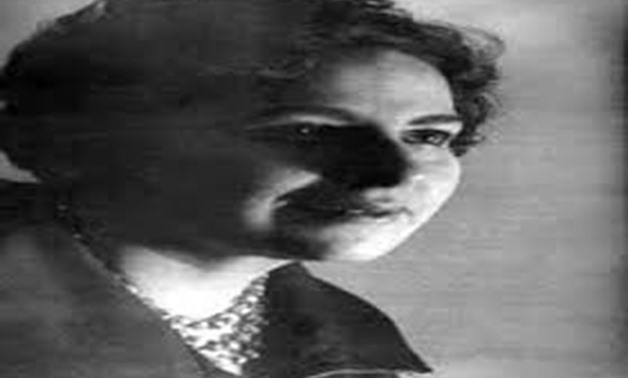
File - Latifa al-Zayyat.
CAIRO – 14 October 2018: “I wrote these diaries ten years ago, a perspective of a fifty-year-old woman differs from that of a sixty-year-old, although both perspectives with their different aspects and contradictions seek, at the end, to create a sense of acceptance.”
These opening sentences were written by Egyptian writer Latifa al-Zayyat in her diaries “Al-Shykhukha”.
It is a part of a set of diaries called difShykhukha and other storiesr storiesaries called differs from that of a sixty-year-old, although both perspectives with their diffLatifath diary since it resembles her life.
The diary brings together three different perspectives of a woman that goes nameless throughout the diary and who is referred to as "the mother".
The diary depicts the unhealthy relationship between the mother and her daughter, Hannan.
Zayat manages to point out the sickening attachment of the mother to Hannan and prior to this, her husband Ahmed.
The motherrriunhealthy dependency, self-realization and her journey of healing can be traced through Psychoanalysis, as well as, feminism.
The dairies provide a different reading which proves its richness. The mother writes these diaries as a means of a therapeutic act, understanding the self, reaching higher levels of maturity, accomplishing independency in relationships.
“For the second time I have the desire to write my diaries and face myself using the pen and papers.
The diaries are written in simple, everyday language, but with sophisticated images which add depth to the writing.
For example, the dream and the black birds, which I will extensively talk about in the following paragraphs, are so distorted and the use of psychoanalysis is inevitable to create a meaning out of it.
Some images used by Zayyat are explicit when she is referring the mother’s definition of Love: “I butchered my worlds and offered them as a sacrifice to the deity. Thus, I got lost because I've nothing left for myself.''
The image gives a sense of morbidity, how can giving someone love be similar to butchering and sacrificing, unless it is a sick kind of love?
The diaries are not written in a linear way. Zayyat succeeds in engaging the readers into the story. With the existence of three perspectives of the mother at her 40s, 50s and 60s, readers go back and forth in the world of the mother, closely tracing her development and witnessing her journey into maturity and complete independence.
Everything is written from the mother's point of view, even the other characters like her Husband Ahmed, her daughter Hannan and her husband Hesham.
Readers don’t get a neutral representation of these characters, but all are opinionated representations. Thus, at times they are supporting people, and at other times they are evil.
Reading between the lines is the only way to get a true representation of the characters. Ahmed was blamed by the mother for being emotionally detached from her and for a while readers think he is cold-hearted.
But, after getting into the story, readers get to know that Ahmed was actually treating her as a “goddess”, showering her with love in the beginning of their marriage.
By time, the mother misused this love and got addicted to it. She started to blackmail Ahmed to provide her with the same love and care she used to get when they were younger.
But this addiction along with blackmailing made Ahmed emotionally turn away from her.
Furthermore, Hannan was misrepresented as the one suffering from “fetal attachment”.
The mother presented Hannan as the one who was attached to her, the one who doesn’t have a distinguished self, and the one who is dependent on her.
Zayyat manages to display the mother’s misrepresentations of her surroundings in order to depict her fear of realization and inability to accept her sickness.
The mother goes nameless as Zayyat tries to explain how mothers unintentionally erase their personalities and bury them in their husbands and children.
Zayyat describes in one of the paragraphs her relationship with Hannan before detecting the error.
The Mother says “I lived with her each and every moment in our lives: when she is preparing for every exam, when she is waiting in fear for each result, when she passes them all, when she joins the faculty and graduates […] just like fabric my life and her life were woven together that we became one.”
On a first reading, one can envy such intimate relationship between mother and daughter, but on a second reading, one can feel its sickness and unreasonable attachment.
The way the mother loves and cares for the daughter is depicted by Zayyat as immature and child-like. The mother wasn’t taught how to love unconditionally and at the same time keep her distinguished self.
Zayyat is aware of psychoanalysis and its terms and she uses it in the diaries. For example, she provides the mother with variant techniques to alienate herself from the truth and maintain her self-denial.
One time the mother projects her feelings on her daughter when the psychiatrist diagnoses the relationship between Hesham and Hannan as “fetal attachment”.
The mother writes “[..] I am still fighting to make her have her own independent self, away from me or anyone else […]".
A second technique when she contradicts herself showing a Freudian slip of the tongue: “I was completely aware of her dependency on me at the age of 16 after the death of her father […] Hannan has always had her distinguished world away from me..” A third technique when she forgets. The psyche tends to transfer hurtful feelings into forgetfulness.
All these contradictions and projections used by the mother are means of escaping the truth, a way of masking her fear of losing her daughter’s care as she lost Ahmed’s. But the dream is used by Zayyat to let her readers into the mother’s subconscious without any resistance from her Super Ego.

Comments
Leave a Comment